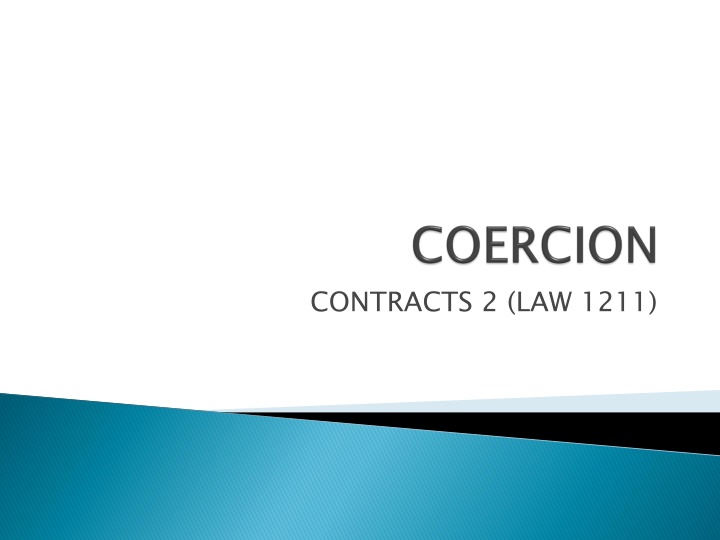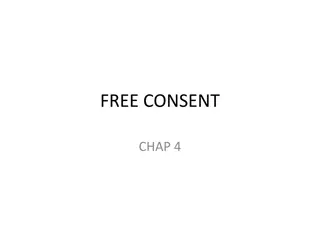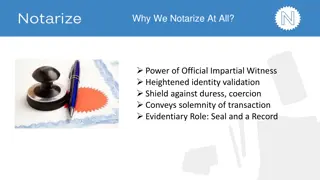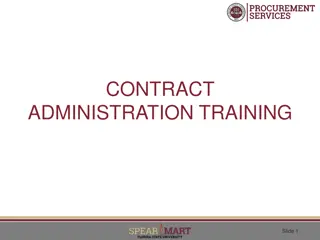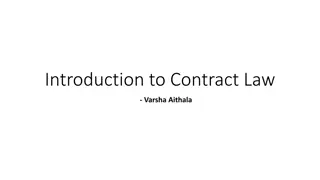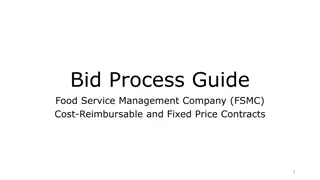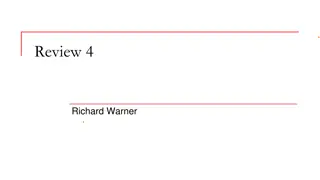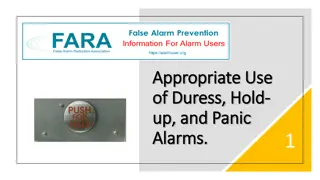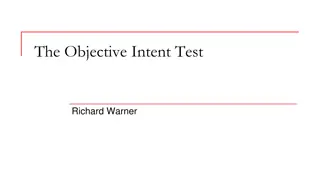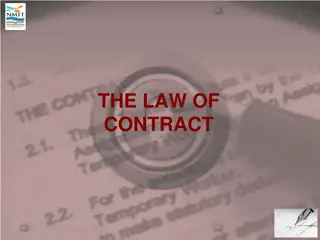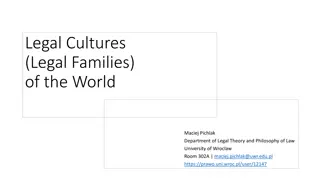Legal Analysis: Coercion and Economic Duress in Contract Law
Explore the concept of coercion in contract law, examining cases of disputed prices, alleged economic blackmail, and the implications of section 15 of the Contracts Act 1950. The court deliberates on the definition of coercion and considers the relevance of the English rule of Economic Duress. Learn about key legal principles governing free consent, factors vitiating consent, and the implications of undue influence in contractual agreements.
Download Presentation

Please find below an Image/Link to download the presentation.
The content on the website is provided AS IS for your information and personal use only. It may not be sold, licensed, or shared on other websites without obtaining consent from the author.If you encounter any issues during the download, it is possible that the publisher has removed the file from their server.
You are allowed to download the files provided on this website for personal or commercial use, subject to the condition that they are used lawfully. All files are the property of their respective owners.
The content on the website is provided AS IS for your information and personal use only. It may not be sold, licensed, or shared on other websites without obtaining consent from the author.
E N D
Presentation Transcript
Agreement Contract Requirement of Free consent Meaning of Free consent Factors that vitiate free consent Provisions: Section 10 Section 13 Section 14
Literally: to coerce means to make somebody do something by using force or threats. To compel by force or threats. Legally (section 15 of Contracts Act 1950) The committing, or threatening to commit any act forbidden by the Penal Code, or the unlawful detaining or threatening to detain, any property, to the prejudice of any person whatever, with the intention of causing any person to enter into an agreement.
1. Actual or threatened commission of any act forbidden by the Penal Code; OR 2. Unlawful detaining or threatening to detain, any property (AND) 3. With the intention of causing any person to enter into an agreement.
Teck Guan Trading Sdn Bhd v Hydrotek Engineering (S) Sdn Bhd [1996] Nur Asia Sdn Bhd v Fosis Corp Sdn Bhd & Anor [2006] Chin Nam Bee Development Sdn Bhd v Tai Kim Choo [1988] Perlis Plantations Bhd v Mohammad Abdullah Ang [1988]
Dispute between plaintiff and defendant over the prices of the round bars. D contend that the price was RM1,180 P alleged that there was a typing error as the actual price should be RM1,244. D stated that they initially resisted the demand but later agreed as the plaintiff persistently refused to supply; they required the bar to produce the concrete they had committed themselves to supplying; and there was no time to look for any other source of supply. The round bars were delivered, accepted by the D. D failed to pay full amount. The defendants appealed against the decision as they alleged that on the facts of the case there was an inference of undue influence and/or coercion with reference to 'economic blackmail'.
The Questions considered in the Court were: 1. The meaning of Coercion under Section 15 of the Contracts Act 1950 2. Whether English rule of Economic Duress is relevant?
There are two ways of committing 'coercion' as defined by s 15 of the Contracts Act 1950 ('the Act'), one of which is the threatening of an act forbidden by the Penal Code, while the other is the unlawful detention or the threatening of such to the prejudice of any person, with the intention of causing any person to enter into an agreement. The party contending that there was coercion must say what offence had been committed under the Code before the court could decide whether such an offence had been committed. IN this case? No offence under the Code had been revealed. Refusal of the plaintiff to supply the round bars at RM1,180 did not amount to unlawful detention of property as the plaintiff was exercising its legal right over its own property.
The contention of 'economic blackmail' has been variedly termed under the English law as 'commercial pressure', 'economic duress' and 'unfair use of a dominant bargaining position'. However, the parties here were dealing with each other at arms' length and in fact the first defendant had before agreeing to the new price, threatened legal action. Given their pugilistic stance before the agreement, the plaintiff could not be said to be in a position to dominate the will of the defendants within the ambit of s 16 of the Act. The transaction in this case was a transaction in the ordinary course of business a transaction in the ordinary course of business.
After supplying goods to Defendant who failed to pay the sum, Plaintiff got the 2nd Defendant to sign a written guarantee and sued upon that guarantee. Defendant argued that the guarantee was given under coercion, as he was positioned in such an intimidating and assaulting manner. Court: The written guarantee was tainted with coercion as defined in section 15.
[Plaintiff s purchasers of a house ; defendants construction co./house developer ] Respondents/Plaintiffs entered into a Sale/Purchase Agreement to purchase a house each at RM29,500 to be constructed by appellants/defendants. Later, appellants asked for the additional payment of RM4,000 by each plaintiff to the defendants. The respondents alleged that the additional sum of RM4,000 was paid under threat and coercion Company. At the conclusion of the trial, the learned Magistrate found that the additional payment of RM4,000 by the respondents to the appellants was an increase in the purchase price and was obtained by means of threat and coercion. Hence, this appeal. paid under threat and coercion by a director of the appellant
The word coercion in the context of s. 73 of the Contracts Act 1950 should be given its ordinary and general meaning since there is nothing under s. 15 which states that the word coercion should apply throughout the Act. The definition of coercion in s. 15 should only apply for the purpose contained in s. 14, it specifically states so.
Since there was no good or sufficient cause to upset the findings of facts by the Magistrate that the respondents in this case had paid the extra sum of RM4,000 to the appellants without consideration but paid under threat by the appellants to cancel their bookings for their houses, the amounts paid by the respondents must be refunded to them under s. 73 of the Contracts Act.
